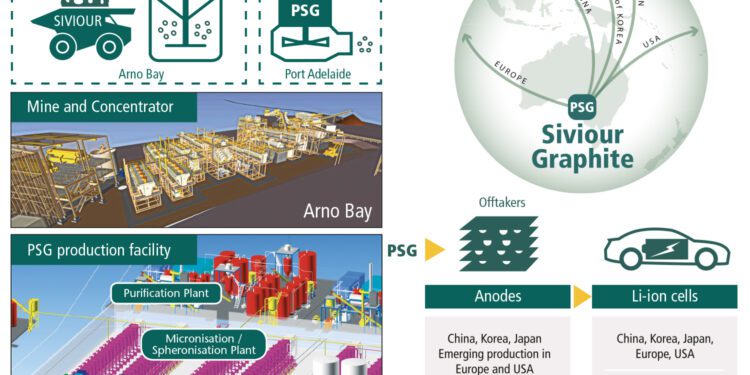Renascor Resources Limited (ASX: RNU) has completed successful commercial-scale downstream milling equipment trials for its planned vertically integrated graphite mine and battery anode material manufacturing operation at the Siviour Project in South Australia.
The trials have confirmed spherical graphite yields in excess of 65% (versus the 50% yield adopted in Renascor’s Battery Anode Material Study.
Milling Trials
The production of Purified Spherical Graphite (PSG) requires that Graphite Concentrates are first mechanically shaped into a micronised spherical form before being purified for use in lithium-ion battery anodes.
Customers generally require that a number of physical specification parameters, including product size, particle size distribution, tap density and surface area, must be achieved after the milling process for use in high quality anode material.
To prepare for engineering design works for its planned PSG manufacturing facility in South Australia, Renascor recently completed milling trials on commercial-scale milling equipment designed to micronise and spheronise Siviour Graphite Concentrates.
The trials tested multiple milling and spheronisation technologies, with trials undertaken in Asia, the United States and Europe at both equipment manufacturers and laboratories with milling test facilities.
The trials were supervised by Renascor’s external engineering advisors Wave International. A key objective of these mill trials was to maximise the amount of graphite that can be processed from Siviour Graphite Concentrates into a spherical form (Spherical Graphite) that meets the physical product specifications of Renascor’s existing and potential additional offtake partners.
Spherical Graphite that meets these physical product specifications can be purified to battery-grade and sold as PSG. Achieving higher yields from the milling process results in the production of higher amounts of PSG and greater profitability with more high value material being produced per unit of concentrate feed.
For purposes of the Battery Anode Material Study, completed in July 2020, Renascor relied upon preliminary equipment trials using up to 60kg samples of Siviour Graphite Concentrates and a projected yield of 50%, which is in line with global industry norms.
The recent trials were conducted on a larger-scale of up to 750kg of Siviour Graphite Concentrates per trial, using Siviour Graphite Concentrates produced from Renascor’s recently completed large-scale pilot flotation programme.
The results of the programme confirmed yields in excess of 65%, consisting of both a primary Spherical Graphite that meets a standard size specification (d50 = 16 microns), as well as finer secondary Spherical Graphite products (d50 ≤ 10 microns). In both cases, the physical product specifications have been achieved.
Renascor expects that the primary PSG product (d50 = 16 microns) will account for the majority of PSG manufactured from Siviour, with the product expected to be used in high-volume lithium-ion battery anode applications (e.g., electric vehicles). Finer PSG products (d50 ≤ 10 microns), which have traditionally been used for high performance and other speciality lithium-ion battery anode applications, are expected to account for the balance of PSG manufactured from Siviour, with the balance between the products to be determined after more detailed negotiations with Renascor’s existing and future potential offtake partners.
Managing Director, David Christensen, said achieving these higher yields from the milling process offers the potential for Renascor to produce more PSG and improve profit margins due to the increased proportion of PSG material being produced per unit of Graphite Concentrate feed.
“Data generated from the equipment trials will be used for engineering design works and final equipment selection for Renascor’s planned PSG facility in South Australia.”
For further information please visit: https://renascor.com.au/












